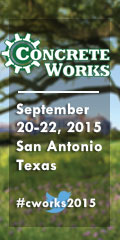NRMCA e-news
National Ready Mixed Concrete Association
NEWS LINKS
Oil prices fell from more than $105 per barrel in June 2014 to under $60 per barrel by the end of the year. Based solely on the historical oil-to-asphalt relationship, PCA expected that asphalt prices would experience a similar decline – to the tune of nearly 30 percent. However, the asphalt PPI through July 2015 is down only four percent from the end of 2014. PCA estimates the asphalt supply dynamics are insulating the asphalt PPI from oil price declines.
Asphalt supply issues have arisen in recent years due to a number of factors, particularly the use of cokers at refineries. Cokers are capital intensive equipment that can further refine the heavy residual material left over from traditional oil refining thus leaving decreased feedstock for roofing tar, road oil and asphalt. According to the U.S. Energy Information Administration, U.S. Product Supplied of Asphalt & Road Oil has decreased more than 37 percent on an annual average basis since 2006. If current trends among oil prices and asphalt supply hold, PCA estimates asphalt’s PPI decline will be much more muted than that of oil – to the benefit of concrete’s relative competitiveness.
Source: Portland Cement Association's Executive Report e-newsletter for August 31.
When it comes to global warming, most people worry about power plants. Claire White thinks about another kind of plant — those that make cement. "Cement production and cement powder are a major component of greenhouse gas emissions," said White, an assistant professor of civil and environmental engineering and the Andlinger Center for Energy and the Environment at Princeton University. "It accounts for between 5 and 8 percent of human-made carbon dioxide."
Along with co-researchers from across the University, White is exploring ways to manufacture cement with a much lower contribution to global warming. Some of these cement substitutes completely eliminate the need to burn limestone at high temperature, a critical step in standard cement production that accounts for much of the CO2 emissions. By using waste components such as slag from steel manufacturing instead of cement powder, manufacturers can cut greenhouse emissions by 80 to 90 percent, White said.
Source: An August 20 news release issued by Princeton University. Read more.
Dried sewage sludge could be an alternative cement material for concrete, researchers in Malaysia have found. In a study published in the Pertanika Journal of Science and Technology, researchers from Universiti Teknologi MARA investigated the potential of sludge as an alternative cement material for making concrete. The disposal of sludge from sewage water treatment is a big issue for wastewater plants in Malaysia. While studies show that the volume of sludge is expected to rise, disposal options are limited due to stricter environmental regulations, including a ban on burying sludge in soil due to its high heavy metal content that could cause adverse impacts to the environment.
A September 9 posting on the Web site WaterWorld. Read more.
PAVEMENTS
Last year, NRMCA Senior Director, Local Paving, Doug O’Neill and Greg Novitzki, executive director of the New York Concrete Promotion Council, assisted on a project uncovered by one of NRMCA’s promotion partners, Frank Surianello, president of Surianello General Concrete Contractors, Inc., in Buffalo, NY. Surianello has been chairman of the New York State chapter of the American Concrete Pavement Association (ACPA) since 2008 and was named national chairman of ACPA in 2013, its 50th Anniversary year. The Niagara Falls Bridge Commission was proposing a toll plaza and access road, some of which was designed in asphalt. The promotion team submitted the project to NRMCA's Design Assistance Program (DAP) and, as a result, the project reportedly used 3,500 cubic yards of concrete. Although Surianello did not get the job, the fact that the design team took NRMCA’s recommendations from our DAP was a considerable success.
"Frank's efforts to flip this project to 100% concrete were the reason it went as it did and despite his company not getting the work, his promotional outlook recognizes that as long as it went concrete, it was a success." said O’Neill, who added that the design team also accepted the detailed jointing plan proposed by NRMCA’s Amanda Hult. For more information, contact Doug O’Neill at doneill@nrmca.org.
Maryland Route 210 is a busy corridor that feeds the Washington, DC, Beltway. With heavy commercial and private use of this busy road, a durable pavement was required that does not need constant, delay-causing repairs and maintenance. To minimize construction delays and maximize project life, the Maryland State Highway Administration choose a concrete overlay as the paving solution. Completed in one month, the project was diamond grinded for a smooth surface and quiet ride. NRMCA member Chaney Enterprises, which has aggressively promoted concrete for streets and roads in recent years, provided the concrete for this project. This is the largest concrete overlay in Maryland’s history, totaling 1.43 miles or 40,269 square yards. More than 27,000 vehicles drive over this section daily.
For more information, contact Glenn Ochsenreiter at glenn@nrmca.org. ENGINEERING
ACI Committee 301 has incorporated several revisions to the Specification for Structural Concrete from its previous version published in 2010. As part of the approval process, the ACI standard is posted for public comment. The public comment period is open through Friday, October 23. The committee is required to address comments on the proposed document prior to final publication. The committee can either reject comments with reason, make revisions as suggested or defer addressing comments to the next cycle as new business. Comments should be submitted on the provided Comment Form.
The draft ACI 301-15 and comment form can be downloaded here. NRMCA's Colin Lobo maintains membership on ACI Committee 301.
Registrations is now closed for the Annual NRMCA Concrete Technologist Training and Certification Course (Short Course) scheduled for November 2-6 in Silver Spring, MD. The next regional short course is scheduled for February 8-12, 2016, in Des Moines, IA; NRMCA is accepting registration for that course. There is a limit to the number of registrants because of space restrictions.
Click here for registration links, more information and staff contact. OPERATIONS, ENVIRONMENTAL, SAFETY & HR
On Monday, NRMCA submitted a formal request to the National Highway Traffic Safety Administration (NHTSA) asking for a 90-day extension of the public comment period for a recently-published advanced notice of proposed rulemaking (ANPRM) aimed at requiring and strengthening rear underride guards for single unit trucks (SUTs), such as ready mixed concrete trucks. The proposal aims to consider possible amendments to the Federal motor vehicle safety standards (FMVSS) to require rear impact (underride) guards on all SUTs, including mixer trucks. While mixer trucks are currently required to install rear guards if they qualify, as per the Federal Motor Carrier Safety Regulations (FMCSRs), the proposal would now require that SUTs be compliant under NHTSA with a more robust standard, similar to the Canadian motor vehicle safety standards. Such a new requirement, which would also be imposed on tractor-trailer trucks as well, would potentially mean new mixer trucks would need to be equipped with a larger, heavier, more expensive underride guard than is currently required.
NRMCA’s extension request, in part, noted, "To ensure that a final rule is based on sound science, correct industry data and has the greatest degree of public participation, it will require more time for the ready mixed concrete industry and the public to evaluate and properly respond to the proposal. Such an extension will allow adequate time for a thorough assessment of the proposal’s impacts in order to provide NHTSA with the most accurate and responsible comments as they pertain to the ready mixed concrete industry. To this point, NRMCA is working with the Truck Mixer Manufacturers Bureau (TMMB) to determine how the proposal will impact ready mixed concrete truck manufacturers and thus downstream impacts on their customers: concrete producers. To gain a full and comprehensive understanding of these impacts, more time is needed to flesh out the impacts through NRMCA and TMMB."
Absent an extension, the public comment period for the ANPRM ends September 21, 2015. Click here for more information or contact Kevin Walgenbach at kwalgenbach@nrmca.org.
With hiring and retention of paramount importance in the recovery, it is critical that ready mixed concrete front line supervisors understand the scope and tasks they are expected to execute. According to the U.S. Department of Labor, the most common business lawsuit filed is by employees against their employers - and the employees cite their direct supervisor as the cause. Therefore, the class audience is plant and area managers, operations, dispatch, fleet and driver supervisors, as well as QC supervisors. Content includes industry-specific, hands-on exercises to develop solid procedures to increase efficiency and profitability using better communication skills with front line employees. The class will be held November 17-19 at NRMCA headquarters in Silver Spring, MD.
The Effective Supervisor Course is held just once a year. Training reduces risk: No producer’s bottom line can afford an expensive internal attack.
Click here for registration options, NRMCA staff contact and more information.
Registration continues for NRMCA’s Safety Course to be held in Charlotte, NC, from November 17 - 19. This 2.5 day course teaches participants about OSHA safety compliance, including why safety is so important, and details the reasons why an effective safety program actually saves money through loss prevention and control. Participants learn about electrical safety, machine guarding, fall protection, hazard communication, confined spaces, personal protective equipment, fire fighting and evacuation, maintenance shop safety, chute handling, fleet safety, pre-trip inspection and more.
Click here for more information, including registration options, hotel reservations or staff contact.
This year’s Environmental Certification Course will be held in Orlando, FL, from December 1-3. Course attendees will be educated on industry-specific environmental issues that affect ready mixed concrete production, including the Clean Water Act, the Clean Air Act, Discharge Permits, Stormwater Management, the Resource Conservation and Recovery Act, Solids Management, Hazardous Materials, Dust Control, Recycling, Spill Prevention Plans, Air Quality Management, Noise Management, Environmental Auditing and much more.
Those who should attend include plant managers, environmental managers, compliance managers, executives or anyone with fiscal and/or environmental responsibilities that should know the details concerning your company’s responsibilities when it comes to EPA regulations, the Clean Water Act, Discharge Permits, Stormwater Management and numerous other critical environmental matters.
Click here for registration options and other information or contact Gary Mullings at gmullings@nrmca.org or Jessica Walgenbach at jwalgenbach@nrmca.org.
GOVERNMENT AFFAIRS
Media articles on Congress, transportation infrastructure, regulation, taxes and other subjects, each of which relate to the ready mixed concrete industry, are updated each week by NRMCA's Government Affairs staff. To access the most recent compilation of articles for September 7 - 11, 2015, please click here.
If you would like to receive this weekly updated link in a separate e-mail, or if you have questions or comments about the roundup, contact NRMCA’s Jill Landry at jlandry@nrmca.org.
The Department of Transportation (DOT) announced earlier this month that the Highway Trust Fund will remain solvent until May 2016 due to a slight uptick in gasoline and trucking excise taxes combined with running a surplus from a slowdown of construction during the winter months. The latest $8 billion extension passed in July by Congress was expected to last until December 2015. Last week’s announcement from DOT provides lawmakers with additional time to come up with a plan to fund a long-term highway bill. However, since transportation program authorization expires on October 29, another short-term extension of policy will be needed.
The House Transportation and Infrastructure Committee (T&I) was expected to release a highway bill last week with a markup of the bill this Thursday, September 17. House Chairman Bill Shuster (R-PA) commented about the delay in introducing the highway bill over the weekend, stating that the T&I Committee is now aiming to introduce a bill by the end of September or early October. A detailed plan on how to fund a long-term bill has yet to be released by House Ways and Means Chairman Paul Ryan (R-WI). Chairman Shuster said that he does not want to do what the Senate did and pass a bill with six years of authorization, but only three years of funding. On Friday, September 11, NRMCA along with 68 other transportation and industry stakeholders sent a letter to the House of Representatives urging passage of a six-year surface transportation bill. Click here to read the House letter. NRMCA also signed onto the Transportation Construction Coalition (TCC) and Americans for Transportation Mobility (ATM) letter sent to Senate members thanking them for the passage of the DRIVE Act before the August recess.
For more information please contact NRMCA’s Kerri Leininger at kleininger@nrmca.org. Earlier this month, Senator Lamar Alexander (R-TN) and Representative John Kline (R-MN) introduced the Protecting Local Business Opportunity Act, S 2015 and HR 3459. The bill is a direct response to the recent ruling by the National Labor Relations Board (NLRB) on the joint employer standard in the Browning Ferris case. In the bill, a company would not be responsible for the labor violations committed by a contractor or business partner of that company and also provide clarification of direct and indirect employers.
The NLRB decision in the Browning Ferris case was determined in August when the board ruled (3-2) that a company is responsible for labor violations that its subcontractor commits. The most significant changes in the standard are that companies that have direct or indirect control of its employees are now responsible for labor violations of those workers. Also, a company could be deemed a joint employer if it has the potential to have direct control of the workforce. The Senate bill currently has 36 cosponsors and the House bill has 25.
For more information please contact NRMCA’s Kerri Leininger at kleininger@nrmca.org.
EDUCATION &TRAINING
NRMCA is offering its information-packed. one-day course, Handling Concrete Specifications, Low Strength Problems and Mixture Submittals, intended for concrete producers, contractors, engineers and testing labs for the first time online, October 6, 7 and 8 between 11 a.m. and 1:30 pm Eastern time each day. This one-day course will get into code and specification requirements (ACI 318, 301, ASTM C94) governing ready mixed concrete and address many topics, including:
Course instructors are Luke Snell, P.E., FACI, FASCE, Western Technologies and Karthik Obla, Ph.D., P.E., NRMCA vice president , technical services. Producers, contractors, engineers and testing labs will find the discussions on investigating low strength problems and specifications very helpful to address issues that impact partnering, project cost and schedule. Upon successful completion of the course, attendees will earn 8 professional development hours, a certificate of completion and credits toward NRMCA’s STEPS program.
Click here for more information, including staff contact. On Wednesday, November 4, from noon to 12:30 p.m. Eastern time, NRMCA will host a free Webinar, STEPS™ A Long Term Career Tool for the RMC Industry. Because STEPS® (Seminars, Training & Education Programs) continues to play an important role in the ready mixed concrete industry as its premier certification program, this short, FREE Webinar will discuss what the program is and how to enroll. Learn how STEPS® encourages industry employees to participate in a broad range of technical, operations, sales and sustainability classes through NRMCA, state associations and through their respective companies. The program also builds industry-wide standards for consistent performance that not only enhances business outcomes but also illustrates to employees that they have a device to plan long-term ready mixed concrete careers.
Click here to register. For more information, contact Eileen Dickson at 240-485-1164 or edickson@nrmca.org.
CALENDAR
*Please note that e-mail and direct links to each event listed below can be accessed from NRMCA's Web site.
September 20 - 22, San Antonio, TX
NRMCA's ConcreteWorks 2015
Email: Jessica Walgenbach, 888-84-NRMCA, x1152
September 28 - 30, Ontario, CA
Concrete Durability Course
Email: Karen Bean, 240-485-1168
October 6 - 8, Online Class
Handling Concrete Specifications, Low Strength Problems and Mixture Submittals
Email: Jessica Walgenbach, 888-84-NRMCA, x1152
October 13 - 16, Silver Spring, MD
CCSP Module I: Concrete 101
Email: Jessica Walgenbach, 888-84-NRMCA, x1152
November 2 - 6, Silver Spring, MD *Sold Out
Annual Concrete Technologist Training and Certification Course "Short Course"
Email: Karen Bean, 240-485-1168
November 4, Free Webinar
STEPS A Long Term Career Tool for the RMC Industry
Email: Jessica Walgenbach, 888-84-NRMCA, x1152
November 17 - 19, Silver Spring, MD
Effective RMC Supervisor Course
Email: Jessica Walgenbach, 888-84-NRMCA, x1152
November 17 - 19, Charlotte, NC
NRMCA Safety Course
Email: Jessica Walgenbach, 888-84-NRMCA, x1152
December 1 - 3, Orlando, FL
Environmental Course
Email: Jessica Walgenbach, 888-84-NRMCA, x1152
December 1 - 3, Silver Spring, MD
CCSP Module II: Customer Business Knowledge
Email: Jessica Walgenbach, 888-84-NRMCA, x1152
December 8 - 11, Orlando, FL
Plant Manager Certification Course
Email: Jessica Walgenbach, 888-84-NRMCA, x1152
2016
January 26 - 29, Omaha, NE
Plant Manager Certification Course
Email: Jessica Walgenbach, 888-84-NRMCA, x1152
February 8 - 12, Des Moines, IA
Regional Concrete Technologist Training and Certification Course "Short Course"
Email: Karen Bean, 240-485-1168
February 23 - 25, Silver Spring, MD
CCSP Module III: General Business Knowledge
Email: Jessica Walgenbach, 888-84-NRMCA, x1152
March 13 - 15, San Diego
NRMCA's Annual Convention
Email: Jessica Walgenbach, 888-84-NRMCA, x1152
March 22 - 24, Silver Spring, MD
CCSP Module IV: Professional Sales Skills
Email: Jessica Walgenbach, 888-84-NRMCA, x1152
April 5 - 8, Birmingham, AL
Plant Manager Certification Course
Email: Jessica Walgenbach, 888-84-NRMCA, x1152
May 15 - 18, Washington, DC
International Concrete Sustainability & Self-Compacting Concrete Conference
Email: Lionel Lemay, 847-918-7101
|











